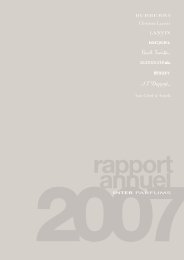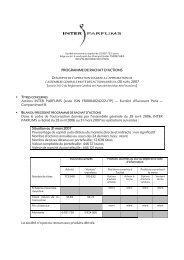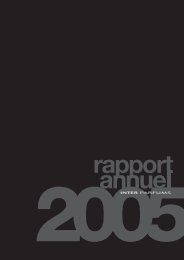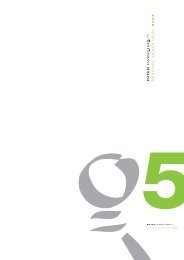2006 - Interparfums
2006 - Interparfums
2006 - Interparfums
Create successful ePaper yourself
Turn your PDF publications into a flip-book with our unique Google optimized e-Paper software.
within the Group, even though vested with all powers<br />
conferred upon him by the law to represent the company,<br />
the Chairman and Chief Executive Officer must obtain the<br />
authorization of the Board to pursue growth strategies that<br />
could have a material impact on the accounts and modify<br />
the scope of the company's activity, strategy and financial<br />
structure. In consequence, the Board was consulted on<br />
several occasions in connection with the signature of new<br />
license agreements and the Board confirmed the Chairman's<br />
powers to conduct these negotiations.<br />
Information concerning directors<br />
Article 15 of the bylaws stipulates that the Chief Executive<br />
Officer shall provide each director with all documents<br />
necessary to perform their duties. Before each Board<br />
meeting, Directors consequently receive all documents<br />
and information necessary to this purpose. In addition in<br />
connection with Board meetings, Directors may be regularly<br />
provided with all material information concerning the<br />
company.<br />
Internal control procedures<br />
Internal control refers to a set of processes, methods<br />
and measures defined by general management to ensure<br />
a coherent and effective system of corporate governance<br />
and management of company operations.<br />
Internal control procedures implemented by Inter Parfums<br />
management that apply to all Group companies are destined<br />
to provide a reasonable assurance that the following<br />
objectives are met:<br />
■ safeguarding corporate assets,<br />
■ identifying, limiting and avoiding risks of errors and other<br />
irregularities in the management of operations to ensure that<br />
they remain consistent with the objectives defined by<br />
corporate bodies in relation to the businesses of the<br />
company and remain in line with the annual budget targets,<br />
■ ensuring the accuracy and thoroughness of accounting<br />
records and the publication of reliable and timely information<br />
fairly presenting the activity of the company for the period in<br />
question,<br />
■ ensuring compliance with laws and regulations.<br />
One of the objectives of internal control is to manage and<br />
prevent risks resulting from the activity of the company and<br />
risks of material errors or fraud, particularly in accounting and<br />
financial areas. An in-depth review of the risk factors affecting<br />
Inter Parfums is presented in the management discussion<br />
and analysis.<br />
However, no system of internal control can provide an<br />
absolute guarantee concerning the elimination of risks and<br />
the effective implementation of procedures.<br />
<strong>2006</strong> annual report inter parfums<br />
corporate governance<br />
1.<br />
General overview of internal control procedures<br />
The organization of the Inter Parfums Group is centralized at<br />
the level of the Inter Parfums company that assures the main<br />
activity of the Group. To this purpose, it possesses a<br />
significant administrative and commercial organization that it<br />
makes available to other Group companies. Relations with<br />
Inter Parfums are governed by assistance agreements,<br />
service agreements, the provision of personnel and<br />
equipment. Fees are invoiced for the latter in proportion<br />
to the level of services rendered.<br />
Members of the Finance Department team actively participate<br />
in overseeing internal control procedures, intervening both<br />
on a top-down and a transversal basis. In consequence they<br />
play a decisive role in the way internal controls are exercised<br />
by management.<br />
The key internal control procedures of Inter Parfums are<br />
based on the following priorities, defined in terms of their<br />
impact on assets and/or results:<br />
■ key operating processes in the management of production,<br />
sales to distributors and the management of the company<br />
image,<br />
■ processes and managing resources, and notably cash and<br />
currency hedges, human resources, committed fixed costs<br />
and overhead, monitoring capital expenditures and tax<br />
obligations, monitoring the settlement of trade receivables,<br />
■ the processing and communication of accounting and<br />
financial information.<br />
These processes generate information concerning sales<br />
objectives, risks and internal control strategies. An interface<br />
for information generated by the different units responsible<br />
for managing internal control procedures in their respective<br />
areas to general management contributes to an effective<br />
decision-making process.<br />
To increase awareness of the importance of internal control<br />
procedures among management staff, the company has<br />
established and distributed to all operating and financial<br />
departments a manual of internal procedures providing<br />
a detailed description of the principal company processes<br />
including sales/customers, purchasing/suppliers, inventories,<br />
management information systems and personnel/payroll.<br />
This manual also provides detailed information about the<br />
procedure for expense requests and signature authorizations<br />
for bank accounts. In addition, the company has developed<br />
an information technology charter for all personnel to ensure<br />
that information technology resources are operated in an<br />
environment that ensures the security of the company's<br />
computer network.<br />
The Chairman and Chief Executive Officer who decides<br />
the strategic objectives of the company in terms of sales,<br />
accounting and finance, is responsible, in coordination with<br />
the Finance Department, for developing internal control<br />
procedures and resources to be deployed for this purpose<br />
and verify their application by each department. The Finance<br />
Department monitors their implementation and effectiveness.<br />
In general, the organization of the company is assured<br />
through five main departments (Production & Logistics,<br />
Burberry Fragrances, Luxe & Fashion, French Distribution<br />
and Finance & Corporate Affairs) reporting on their activity<br />
to Executive Management on a monthly basis which<br />
constitutes the preferred system of oversight and control.











